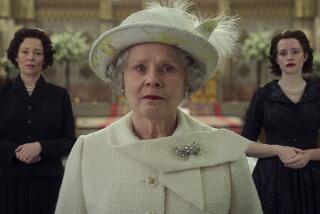A Glass Slipper Broke, and With It Our Childlike Dreams
- Share via
Holed up for the night at a Holiday Inn in Mesquite, Nev., I turned on CNN. At that hour, Princess Diana hadn’t been pronounced dead but was described as critically injured. Normally when traveling, I seldom engage strangers in conversation, but on that night I couldn’t seem to shut up.
The first stop was the concierge in the hotel lobby, a young woman in her early 20s. “Did you hear about Princess Di?” I asked. “She’s here?” the young woman replied.
At a casino next door, I told various people standing in a buffet line as well as my waitress. None had heard the news. Later that night, I wondered what prompted my burst of gabbiness with strangers. It’s not as though I had been a Diana-watcher or had paid much attention to her comings and goings. I couldn’t care less that she had been dating Dodi and didn’t know she’d been crusading against land mines.
So why did I turn into the town crier when hearing of her accident?
Over the next few days, my question was answered.
Turns out that millions of people worldwide either wanted to talk or watch details of Diana’s life and death. Maybe, like me, many were surprised at their reaction to her death. Britishers showed up by the millions to pay homage, which you’d expect, but millions more around the world went to local churches or watched the live funeral coverage, regardless of the broadcast hour. Newspapers from all regions of the United States reported increased sales because of the coverage of her death.
I wonder if any of us could have predicted that Diana’s death, even coming as suddenly and in the prime of her life as it did, would have gotten that kind of attention. A middle-aged woman friend of mine questioned the massive coverage, dismissively referring to Diana as “someone who wore nice clothes and visited people.”
My friend, however, was in a distinct minority. A poll released late last week indicated that nearly nine in 10
Americans paid attention to news of Diana’s death and 54% followed the tragedy “very closely.”
Until her death, according to the poll by the Pew Research Center for the People and the Press, most of Diana’s following came from readers of tabloid newspapers and People magazine. Earlier surveys conducted by the center found only slight interest in Diana’s marital problems: 11% followed them very closely in 1993 and only 3% in 1996.
So we can’t make the argument that Diana was on everyone’s mind and was a beloved figure. As with most celebrities, most of us knew she was around but didn’t pay her much mind.
Why did her death, then, seem to affect people so much?
Because princesses don’t die.
At least, they’re not supposed to. Not like this. Not in inglorious circumstances, like being driven home by a drunk driver and hounded by photographers.
It seems to me that since Diana’s death we’ve been racking our brains as to why we’ve been moved, when the probable answer is more subconscious.
Yes, we feel sorry for her family and sons. We scorn the photographers’ behavior. We condemn the driver’s judgment.
But when all is said and done, it doesn’t explain why her death reverberated.
It’s because princesses don’t die.
Somewhere in our shared subconsciousness is a childlike innocence about how things are supposed to work. From our earliest days, we are entranced by beauty and youth and told that they are good. They are virtuous. Beauty and youth always win out. Ugliness and evil do not.
No one is more beautiful and youthful than a princess. The very word itself reassures and warms us, harking back to some part of our childhood in which stories had happy endings and bad people never won. A princess might be hurt, but she couldn’t die. All it took to revive her was a kiss from a handsome prince, and all would be right again.
Most grown-ups don’t think too much about princesses while we live our lives in the 1990s. The world moves too rapidly and is much too cold for such thoughts.
Until one dies. And then we reflect on the fact that, yes, we had a princess in our midst. We remember that, just like in those stories from way back in our childhoods, this one was young and she was beautiful and she could wear a glass slipper.
And so it’s only when she died that we took notice of things that are missing. It’s only then that we looked up and realized that there aren’t all that many princesses left in the world.
And so we mourn for her and for her friends and family. And, probably without realizing it, we mourn for that part of our past when we were comforted by the presence of princesses.
*
Dana Parsons’ column appears Wednesday, Friday and Sunday. Readers may reach Parsons by calling (714) 966-7821, by writing to him at The Times Orange County Edition, 1375 Sunflower Ave., Costa Mesa, CA 92626, or by e-mail at dana.parsons@latimes.com.
More to Read
Sign up for Essential California
The most important California stories and recommendations in your inbox every morning.
You may occasionally receive promotional content from the Los Angeles Times.













